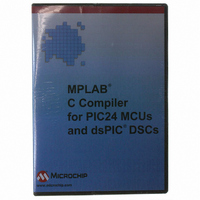SW006012 Microchip Technology, SW006012 Datasheet - Page 46

SW006012
Manufacturer Part Number
SW006012
Description
C COMPILER FOR DSPIC30F FAMILY
Manufacturer
Microchip Technology
Type
MPLAB® C30 Compilerr
Series
PIC24 & DsPICr
Specifications of SW006012
Supported Families
PIC24, DsPIC30F And DsPIC33F
Core Architecture
PIC, DsPIC
Kit Contents
Software And Docs
Mcu Supported Families
PIC24 MCUs And DsPIC DSCs
Tool Type
Compiler
Processor Series
PIC24, dsPIC
Lead Free Status / RoHS Status
Not applicable / Not applicable
For Use With/related Products
dsPIC30F
Lead Free Status / Rohs Status
Lead free / RoHS Compliant
- Current page: 46 of 248
- Download datasheet (3Mb)
MPLAB
DS51284F-page 40
®
C30 User’s Guide
TABLE 3-5:
-Wmultichar
-Wno-multichar
-Wparentheses
-Wreturn-type
-Wsequence-point
Option
WARNING/ERROR OPTIONS IMPLIED BY -WALL (CONTINUED)
Warn if a multi-character character constant is used.
Usually, such constants are typographical errors. Since they
have implementation-defined values, they should not be
used in portable code. The following example illustrates the
use of a multi-character character constant:
char
xx(void)
{
return('xx');
}
Warn if parentheses are omitted in certain contexts, such as
when there is an assignment in a context where a truth value
is expected, or when operators are nested whose
precedence people often find confusing.
Warn whenever a function is defined with a return-type that
defaults to int. Also warn about any return statement with
no return-value in a function whose return-type is not void.
Warn about code that may have undefined semantics
because of violations of sequence point rules in the C
standard.
The C standard defines the order in which expressions in a C
program are evaluated in terms of sequence points, which
represent a partial ordering between the execution of parts of
the program: those executed before the sequence point and
those executed after it. These occur after the evaluation of a
full expression (one which is not part of a larger expression),
after the evaluation of the first operand of a &&, ||, ? : or ,
(comma) operator, before a function is called (but after the
evaluation of its arguments and the expression denoting the
called function), and in certain other places. Other than as
expressed by the sequence point rules, the order of
evaluation of subexpressions of an expression is not
specified. All these rules describe only a partial order rather
than a total order, since, for example, if two functions are
called within one expression with no sequence point between
them, the order in which the functions are called is not
specified. However, the standards committee has ruled that
function calls do not overlap.
It is not specified, when, between sequence points
modifications to the values of objects take effect. Programs
whose behavior depends on this have undefined behavior;
the C standard specifies that “Between the previous and next
sequence point, an object shall have its stored value
modified, at most once, by the evaluation of an expression.
Furthermore, the prior value shall be read only to determine
the value to be stored.” If a program breaks these rules, the
results on any particular implementation are entirely
unpredictable.
Examples of code with undefined behavior are a = a++;,
a[n] = b[n++] and a[i++] = i;. Some more
complicated cases are not diagnosed by this option, and it
may give an occasional false positive result, but in general it
has been found fairly effective at detecting this sort of
problem in programs.
Definition
© 2007 Microchip Technology Inc.
Related parts for SW006012
Image
Part Number
Description
Manufacturer
Datasheet
Request
R

Part Number:
Description:
Manufacturer:
Microchip Technology Inc.
Datasheet:

Part Number:
Description:
Manufacturer:
Microchip Technology Inc.
Datasheet:

Part Number:
Description:
Manufacturer:
Microchip Technology Inc.
Datasheet:

Part Number:
Description:
Manufacturer:
Microchip Technology Inc.
Datasheet:

Part Number:
Description:
Manufacturer:
Microchip Technology Inc.
Datasheet:

Part Number:
Description:
Manufacturer:
Microchip Technology Inc.
Datasheet:

Part Number:
Description:
Manufacturer:
Microchip Technology Inc.
Datasheet:

Part Number:
Description:
Manufacturer:
Microchip Technology Inc.
Datasheet:










